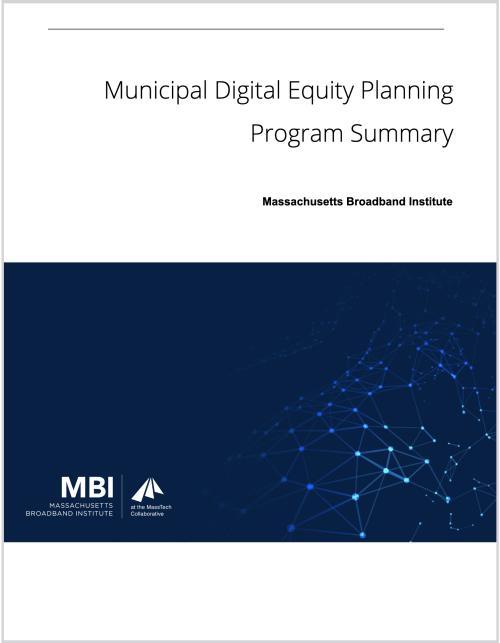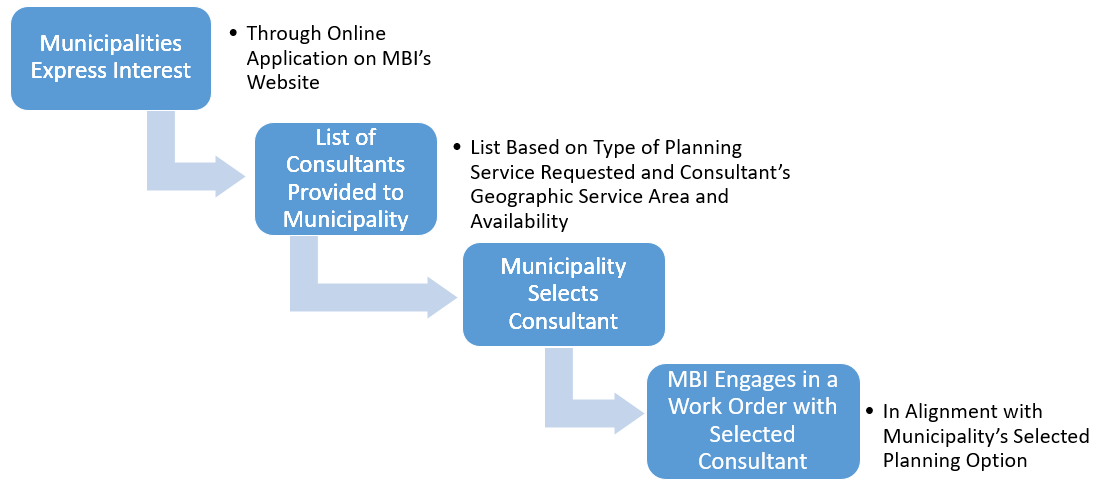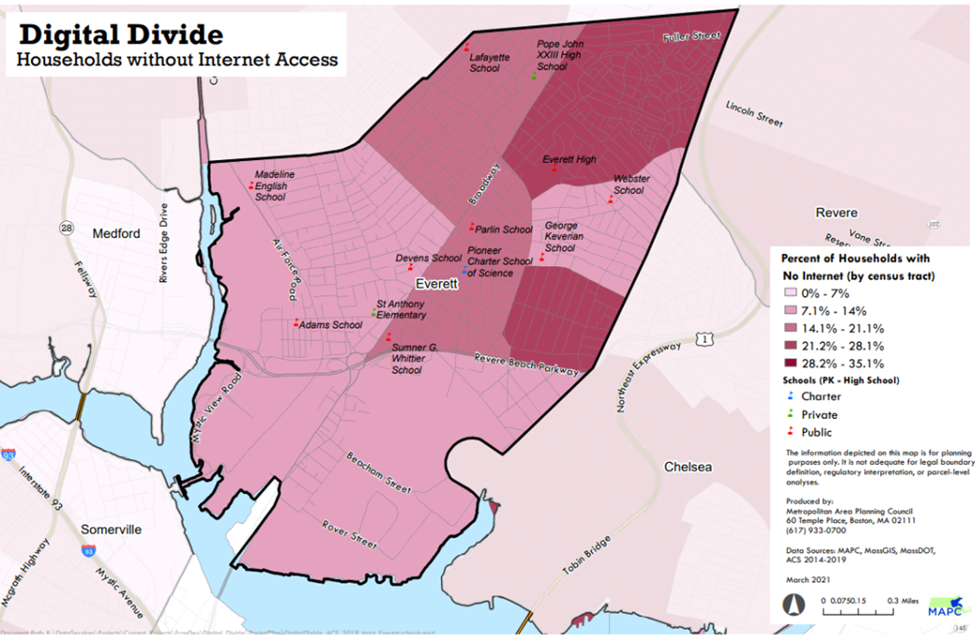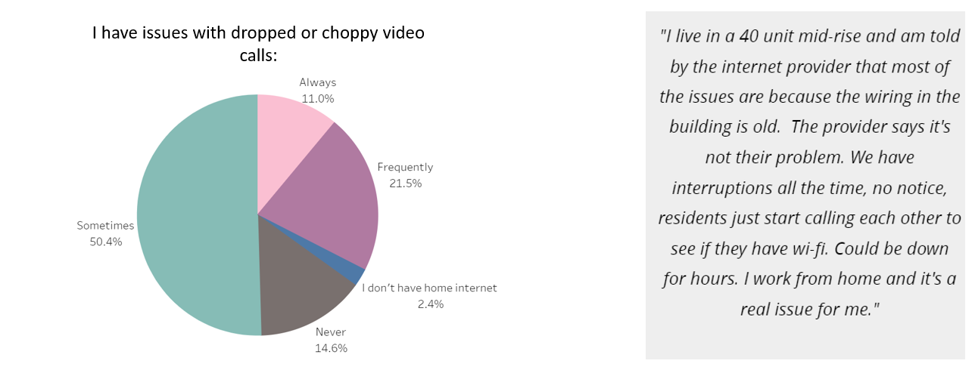Press Releases
May 4, 2023 Mass. Broadband Institute Announces Municipal Digital Equity Planning Program Participants
August 9, 2023 Massachusetts Broadband Institute Announces Several More Participants in Municipal Digital Equity Planning Program
February 21, 2024 Massachusetts Broadband Institute Expands Municipal Planning Program to 16 Additional Cities and Towns Statewide
October 29, 2024 Healey-Driscoll Administration Awards $1.33 Million to Expand Internet Access and Digital Skills Training
Program Overview
The ability to engage in digital equity planning activities will be a critical step for municipal leaders and staff to build a broad understanding of how internet access, or lack thereof, affects residents of their community. The goal of the Municipal Digital Equity Planning Program is to enable municipalities, or other local bodies of government, to engage in planning activities related to digital equity and bridging the digital divide. These planning activities will result in strategic documents designed to identify the community's needs, interest, and key assets and provide a framework that will guide future municipal decision-making and potential investments and activities that will increase access and usage of the internet for the populations most impacted by the COVID-19 pandemic and the digital divide.
Specifically, the Municipal Digital Equity Planning activities will accomplish two goals:
- Guide municipal decision-making and investments that will increase access, adoption, and usage of the internet for the populations most impacted by the COVID-19 pandemic and the digital divide.
- Prepare municipalities to submit grant proposals to existing or forthcoming state or federal programs to support digital equity activities.
Municipalities participating in this program will receive expert advisement on the determining factors of digital access, including:

Internet Availability and Affordability

Device Access

Digital Skills
Similar to planning activities in the economic development field, it may be beneficial to adopt a regional approach to digital equity planning to enable resource sharing, coordination and achieve economies of scale, and therefore, regional approaches will be allowed and encouraged under this program.
The Municipal Digital Equity Planning Program will offer two options to pursue digital equity planning activities with the support of a pre-qualified planning consultant, a short term planning charrette or a longer term Digital Equity Plan process. Both options are intended to yield similar outcomes, but will differ in process, duration of the planning activities and level of detail and nuanced information provided to the municipality that will be incorporated into deliverables at the end of the planning process. Municipalities will be able to take advantage of both planning options if they so choose, thus enabling a pathway for municipalities to advance their thinking related to digital equity planning over time. Municipalities will be able to apply for digital equity planning support individually, or jointly as “regions”.
Participating Municipalities
Download the town's digital equity plan/charrette by clicking on the PDF link below each town in the following table:
| Ashburnham Download PDF | Chelsea Download PDF | Gloucester Download PDF | Middleborough | Randolph Download PDF | Wareham Download PDF |
| Ashby Download PDF | Chicopee | Greater Lowell Region (Billerica, Chelmsford, Dracut, Dunstable, Lowell, Pepperell, Tewksbury, Tyngsborough, Westford)
| Millbury Download PDF | Rehoboth | Watertown Download PDF |
| Barnstable Download PDF Download Appendices PDF | Clarksburg Download PDF | Greenfield Download PDF | Montague Download PDF | Salem | Westfield |
| Berkshire County High Fiber Towns (Becket, Otis, Washington, Windsor) Download PDF | Dalton Download PDF | Hadley Download PDF | Monterey Download PDF | Sandwich Download PDF | Westhampton Download PDF |
| Berkley | Dighton | Hampden | New Bedford Download PDF | Shutesbury & Leverett Download PDF | Whately Download PDF |
| Berlin | East Bridgewater Download PDF | Haverhill Download PDF | New Marlborough Download PDF | Somerset Download PDF | Wilbraham |
| Beverly Download PDF | East Longmeadow Download PDF | Holyoke Download PDF | North Andover Download PDF | Somerville Download PDF | Winchendon Download PDF |
| Boston Download PDF | Easthampton Download PDF | Hubbardston Download PDF | Northern Berkshire County (Adams, Cheshire, Florida, Lanesborough, North Adams) Download PDF | Southbridge Download PDF | Woburn Download PDF |
| Bourne Download PDF | Fairhaven Download PDF | Lakeville | Orleans Download PDF | Southern Berkshire County (Great Barrington, Lee, Lenox, Sheffield, Stockbridge, West Stockbridge) Download PDF | Worcester Download PDF |
| Boylston | Falmouth Download PDF Download Appendix PDF | Lawrence Download PDF | Peabody Download PDF | Springfield Download PDF | Worcester County 5-Town Region (Barre, Hardwick, New Braintree, North Brookfield and West Brookfield) Download PDF |
| Brockton Download PDF | Fitchburg Download PDF | Leominster Download PDF |
Phillipston & Royalston | Swansea Download PDF | |
| Cambridge Download PDF | Franklin Regional Cooperative (Charlemont, Colrain, Leyden, New Salem, Northfield, Orange, Warwick, Wendell) Download PDF | Lynn Download PDF | Pittsfield Download PDF | Taunton Download PDF | |
| Carver | Freetown Download PDF | Mendon | Plymouth County Tri-Town Region (Rochester, Marion and Mattapoisett) Download PDF | Templeton Download PDF Download Appendices | |
| Charlton Download PDF | Gill Download PDF | Methuen Download PDF | Quincy Download PDF | Townsend Download PDF |
Program Details
Municipalities were able to apply to this digital equity planning opportunity through April 25, 2025 OR until the program budget has been scoped, whichever comes first. MBI will review applications on a rolling basis to ensure that all required eligibility criteria are met. MBI may request municipalities to supply additional information if needed. Upon review and approval for participation in the Municipal Digital Equity Planning Program, MBI will provide a list of prequalified consultants that can serve the applicant's needs. The Municipal applicant will then make a selection of the consultant. MBI will then execute a work order with the consultant to provide the planning services and the consultant and municipality will engage in the work. The full cost of the consultant's services will be covered by MBI under this program.
Flow chart explanation of Municipal Digital Equity Planning Application Process
MBI evaluated applications for the presence of impacted (300% poverty) or disproportionately impacted (185%) populations, as defined under U.S. Treasury Guidance related to ARPA SLFR Funds. Communities that demonstrated the presence of these populations were considered eligible to participate in the Digital Equity Planning Program.
A list of questions and answers have been collected and made public as a helpful resource.
Review FAQs
What to Expect
The Digital Equity Charrette option is intended to be a low barrier to entry option to support municipalities with limited staff capacity and existing knowledge or activities related to digital equity. As part of the Digital Equity Charrette, consultants will organize and facilitate an intensive workshop engaging municipal officials, community groups, and other stakeholders (“digital equity stakeholders”) to gather information on the needs of residents and the digital equity issues facing the municipality and focusing on the populations most impacted by the COVID-19 pandemic. With guidance from the municipality’s chosen consultant, digital equity stakeholders will work together to identify priorities, challenges, and solutions addressing the digital equity divide in the municipality
Municipal staff should expect charrette meetings to total approximately 8 hours, spread across one or two days with additional time required for site preparation and clean up. Consultants will be expected to work with municipal staff to enable in person, hybrid, or fully virtual activities as needed by the community.
At the end of the charrette, the municipality will receive a summary report deliverable with strategic recommendations to begin, modify, or expand digital equity programs/investments and a detailed, realistic vision for future action.
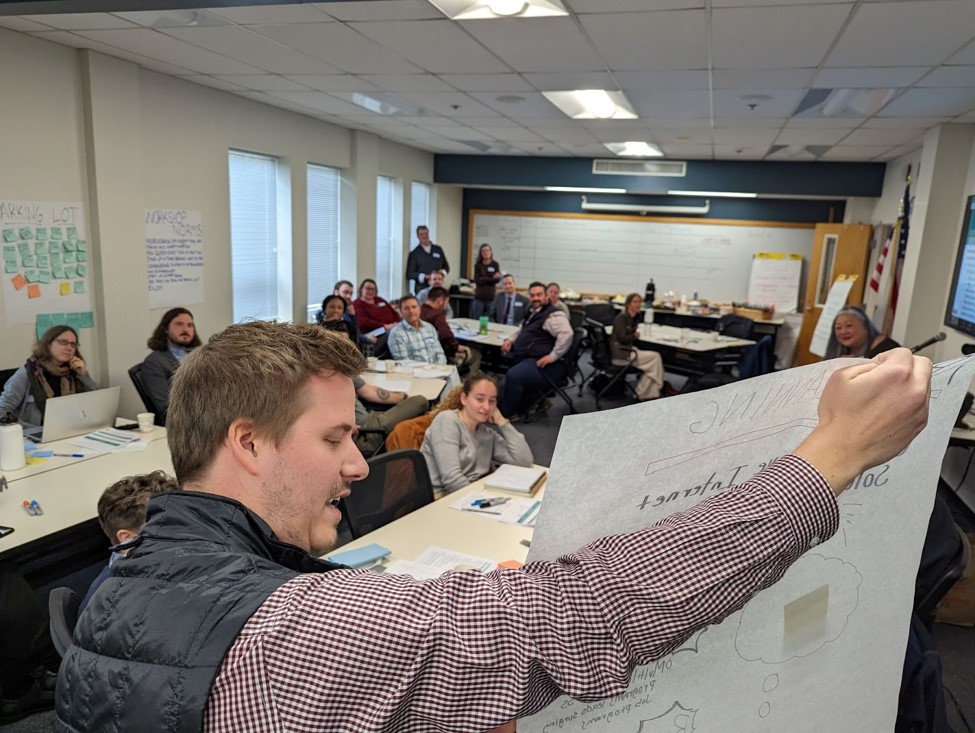
The Digital Equity Planning option is designed to provide municipalities an opportunity to execute a full comprehensive planning exercise. For the Digital Equity Planning option, consultants will provide expanded data collection and dive into deeper conversations and engagement with digital equity stakeholders.
Through the Digital Equity Planning process consultants will provide a comprehensive existing conditions analysis that will provide a baseline overview of digital access and equity gaps affecting the municipality’s populations - including levels of broadband subscription, aggregate speed data, available services and pricing options, and device access/usage.
In coordination with municipal partners, consultants will also engage in an expanded community/stakeholder engagement process to collect a more nuanced and localized layer of data onto the existing conditions analysis that will inform community specific needs related to digital literacy, devices, connectivity, affordability, and other issues related to digital equity.
A suite of strategic recommendations that meet the needs and goals of residents experiencing the impacts of the digital divide will be delivered for consideration and adoption by the municipality. These recommendations will include an assessment of existing or future funding opportunities available through sources that include the American Rescue Plan Act (“ARPA”) and Infrastructure Investment and Jobs Act (“IIJA”).
Municipalities will receive a cohesive and comprehensive final deliverable in report format at the end of the planning process.
See a sample Digital Equity Plan here.
Integration of Digital Equity Plans with Other State Plans and Programs
The Municipal Digital Equity Planning program is designed to integrate with the Massachusetts Statewide Digital Equity Plan. Under the Bipartisan Infrastructure Law, the US Congress allocated $1.45B to the Digital Equity Act (DEA) to support states to develop and implement digital equity strategies and initiatives. Massachusetts has received funding to conduct a statewide digital equity plan that will provide the vision, goals, and implementation strategy for Digital Equity Capacity Grants - a second funding source that will be allocated to states upon completion and federal approval of the statewide digital equity plan. The National Telecommunications and Information Administration (NTIA), the federal agency responsible for administering the Digital Equity Act, has allocated $14.1 million to MA under the Capacity Grant program.
MBI will reflect content and recommendations from all existing municipal or regional digital equity plans in the Massachusetts Statewide Digital Equity Plan as part of key updates to be made under the Capacity Grant.
The Massachusetts Digital Equity Partnerships Program has designated nine Partners as qualified organizations that can implement a suite of digital equity projects that meet the goals outlined in the state’s legislation.
Partners work with organizations including municipal agencies, community development corporations (CDCs), community-based organizations (CBOs), public housing authorities, community colleges, local and regional school districts, healthcare and telehealth organizations (including federally qualified community health centers), and other entities as sub-awardees to implement digital equity projects.
MBI has identified six program areas that align with the legislative goals of the Broadband Innovation Fund and meet federal requirements established by the US Treasury for the use of Coronavirus State and Local Fiscal Recovery Funds (SLRF).
To the extent that municipalities identify local strategies that align with the program areas under the Digital Equity Partnerships program MBI will work to facilitate connection points between active Digital Equity Partners and municipalities engaging in the Digital Equity Planning program.
The intent of the Municipal Digital Equity Implementation Program is to enable municipalities who need funding to mobilize, start-up, and implement digital equity activities locally to access a one-time grant up to $100,000 per municipality to execute a project (or projects) defined in their Digital Equity Plan, Digital Equity Planning Charette, or pre-existing local digital equity plan or related document that MBI deems of sufficient standard. Project implementation will increase access and usage of the internet for the populations most impacted by the COVID-19 pandemic and the digital divide.
Municipalities are strongly encouraged to utilize their planning consultants from the Municipal Digital Equity Planning Program to define a project (or set of projects) scope and budget for implementation. Upon approval from MBI, municipalities may start project implementation and will be accountable to MBI’s reporting requirements, which vary by proposed focus area(s). Note that the process of applying to the Municipal Digital Equity Implementation Program will differ for municipalities that have not engaged in the Planning Program.
Consultant Prequalification Process
Interested organizations can continue to apply to become prequalified consultants by following the instructions outlined in the Municipal Planning Consultant RFQ. Consultants will be pre-qualified on a rolling basis until such a time that MBI deems it has sufficient capacity to fully execute the Municipal Digital Equity Planning Program.
View the RFQ for Consultants to provide Municipal Digital Equity Planning Services
Current Prequalified Consultants
Public Records
As a public entity, MassTech is subject to the Massachusetts Public Records Law (set forth at Mass. Gen. Laws ch. 66) and thus all information, documents and other materials made or received by MassTech and/or its employees are subject to public disclosure. Participants should not submit any information to MassTech that it does not want publicly disclosed, and should assume that all submissions are subject to public disclosure without any prior notice.
Contact Us
For questions or additional information about the Municipal Digital Equity Planning Program and/or Digital Equity Partnerships Program, please contact us at broadband@masstech.org.

